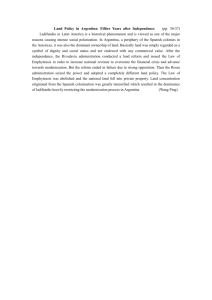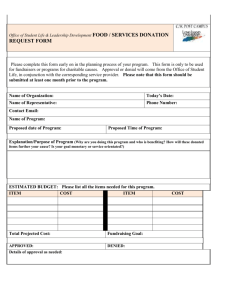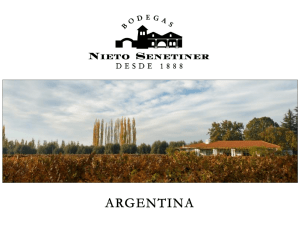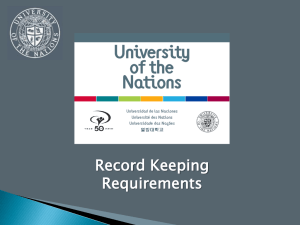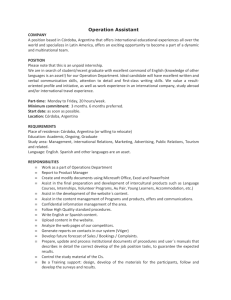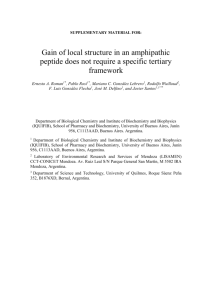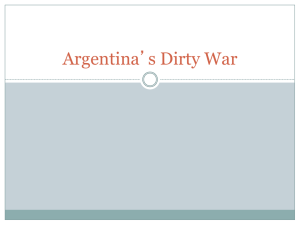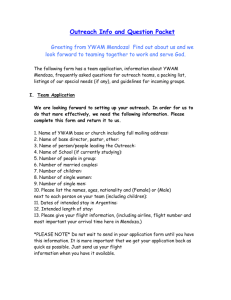Packing list - YWAM Mendoza
advertisement
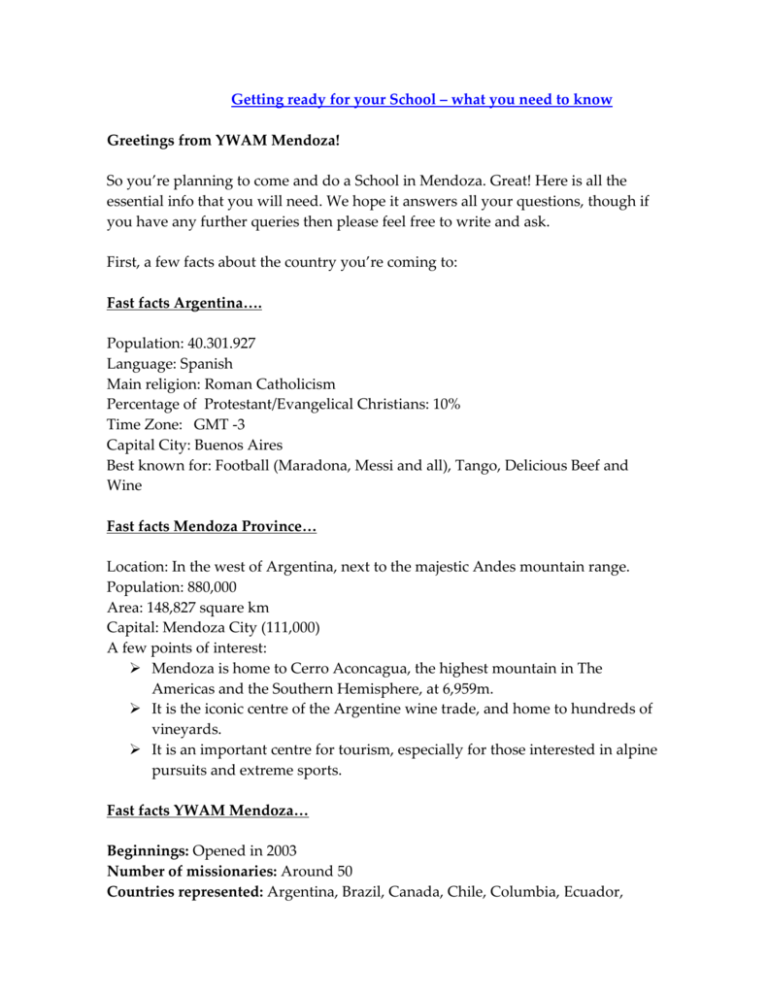
Getting ready for your School – what you need to know Greetings from YWAM Mendoza! So you’re planning to come and do a School in Mendoza. Great! Here is all the essential info that you will need. We hope it answers all your questions, though if you have any further queries then please feel free to write and ask. First, a few facts about the country you’re coming to: Fast facts Argentina…. Population: 40.301.927 Language: Spanish Main religion: Roman Catholicism Percentage of Protestant/Evangelical Christians: 10% Time Zone: GMT -3 Capital City: Buenos Aires Best known for: Football (Maradona, Messi and all), Tango, Delicious Beef and Wine Fast facts Mendoza Province… Location: In the west of Argentina, next to the majestic Andes mountain range. Population: 880,000 Area: 148,827 square km Capital: Mendoza City (111,000) A few points of interest: Mendoza is home to Cerro Aconcagua, the highest mountain in The Americas and the Southern Hemisphere, at 6,959m. It is the iconic centre of the Argentine wine trade, and home to hundreds of vineyards. It is an important centre for tourism, especially for those interested in alpine pursuits and extreme sports. Fast facts YWAM Mendoza… Beginnings: Opened in 2003 Number of missionaries: Around 50 Countries represented: Argentina, Brazil, Canada, Chile, Columbia, Ecuador, Holland, United Kingdom, United States, Peru, Puerto Rico Main ministries: Frontier Missions, Mercy (soup kitchen, homeless shelter, prisons outreach), Sports, Media & Communications, Footsteps of Life (development work and outreach amongst the native Huarpe community in the desert region of Lavalle), Sinergy 31:3 - Performing Arts, Local community outreach, Impact evangelism DTS schools: Football and Arab World DTS, Compassion and Arts DTS, Counselling DTS, Sports DTS, Mercy DTS 2nd level schools: School of Frontier Missions, School of Foundation for Counseling Ministries Frequently Asked Questions General Questions: Can you recommend any web-sites to get airline tickets? Here are a few websites to check out that usually have good prices: www.despegar.com www.expedia.com www.kayak.com www.cheaptickets.com Where should I fly into? You should fly directly into Mendoza airport. The airport is a five minute drive from our community. We recommend also that you fly via Santiago, Chile. If you fly into Buenos Aires you will most likely have to change airports (at your own expense) and possibly pay an extra entry tax which you are not charged if you fly from Santiago. What kind of visa do I need to come into the country for a school? Most nationalities don’t need any special visa to enter Argentina. DTS students can enter the country on a tourist visa, which they receive on arrival at the airport. This visa lasts for three months, and can usually be extended for another three months at the local Immigrations office. Failing that, students can make a weekend trip to Chile and back to renew their visa (This would cost about USD 70). Do I need travel insurance? We recommend it but it’s not absolutely necessary. Whilst in Argentina you have free access to the health service. This may not be the case though for your outreach, so it would be good to have travel insurance for that. You can get decent insurance here in Mendoza if you don’t get it before coming. What immunizations do I need? We recommend getting the normal immunizations for traveling. Here’s a list of them from the internet. Hepatitis A (Recommended for all travelers) Typhoid (For travelers who may eat or drink outside major restaurants and hotels), Rabies (For travelers who may have direct contact with animals and may not have access to medical care.) Routine immunizations (All travelers should be up-to-date on tetanus-diphtheria, measles-mumps-rubella, polio and varicella immunizations) We do still recommend that you contact your hospital and check with them. How does a bilingual school work? We have either simultaneous translation from the back of the classroom or a translator in front. Classes are mostly held in Spanish with an English translation. You will be living, eating, and speaking with people from Argentina and Latin America, so small groups will be mixed with English and Spanish speakers! Is it important to know Spanish? It’s not essential for you to know Spanish, but the more you can learn, the more you will enjoy your time with us. Taking a school is an amazing opportunity to learn a second language, and we encourage you to make the most of it as possible. Don’t worry about making mistakes, that’s all part of the learning process And people will appreciate it a lot when they see you making a genuine effort to learn the language and communicate well. We recommend therefore that you invest in a Spanish/English dictionary, and some sort of ‘Teach yourself Spanish’ material. One website that has some good quality material is www.studyspanish.com They have a good number of free resources, and even more if you are willing to invest. A note of encouragement: many of the translators you will see during your classes learned Spanish from scratch when they arrived for their DTS’s. So there’s no reason why you can’t too! What’s the school schedule like? Students have classes from Tuesday to Saturday. Sunday and Monday are usually free days for the students. However on occasion there may be classes on Monday evenings, and on at least two weekends there will be short outreach trips during the teaching phase. Each week day has classes in the morning, a time of practical serving in the afternoon and then further classes in the evening. These classes are complemented with intercession times, worship, small groups and one-to-one discipleship. The rhythm of the school is intensive, but if a student administers their time well they should be able to fulfill each of their responsibilities and have time to rest in the day too. We desire that students would enjoy very much their time amongst our community, both at work and in their free time. What do I need to bring for the classes? For your classes we recommend that you invest in a good quality pad or workbook, some decent pens and even colored pencils if you like. Investing in a good pad or workbook for class notes is very important, because the hope is that the notes you take will be beneficial to you throughout your entire Christian walk, and not just during the school. Therefore it’s good to have something of a decent quality that will last and can be used as a valuable resource for many years to come. How do you pass the school? Several things are taken into account to evaluate whether a student passes the School or not. Students will take several exams during the school, they are required to write a personal journal each week and will have to carry out book reports. They must also display diligence and responsibility in fulfilling their school commitments, such as keeping the schedule, handing in assignments on time, etc. One area which a lot of importance is given to is the process of personal discipleship. We want to see that students are thinking through and applying what they receive in the classes, that they are open to correction, that they have a willingness to serve and can work well under leadership. During the teaching phase, if the student does not meet their commitments, and shows a persistent unwillingness to respect the school guidelines and the direction of their leaders, they will not pass the teaching phase and will not be able to participate in the outreach phase. How should I pay for my school? The best way to pay for your school is by cash on arrival in Mendoza, in US dollars. Payment via cheque or bank transfer is very complicated due to Argentina’s financial legislation, and therefore not recommended. When do I pay? Payment for the teaching phase is required on the first day of the school. Should you have any difficulties in making this payment, we ask that you let us know as soon as possible. There is a certain amount of flexibility with regard to the payment date in the case of extenuating circumstances. Payment for the outreach phase is required at the midpoint of the teaching phase, about 6 weeks before outreach. If a student fails to pay all the fees for the teaching phase they will not be able to go on the outreach phase. Should I bring down any extra money for anything? Your fees cover both your accommodation and food. However you’ll want to bring extra money for social activities in your free time, personal items and communication costs. Most students can get by with about 10 – 15 dollars a week What will our accommodation be like? If you’re a married couple/family, there will be private housing provided. Single students live in community, which means shared rooms and bathrooms. We hope you will be comfortable and will do our best to help you settle in, however please be prepared for accommodation that may be more basic than what you are used to. How will I wash my clothes on the base? There is a washing machine available for the DTS students to use. What do I need to bring, clothes etc.? See Packing List below How can I contact my family? Do you have Internet and phones that I can use? There is a phone that you can use in the community. However, you will need to use phone cards. There are also ‘locutorios’ (places to make calls in the center of town) where you can phone directly or with a phone card. There is no wi-fi access in the YWAM community, but students will have shared use of a USB internet modem. Can I receive letters and care-packages? Definitely! Please be aware that our mail system takes a long time! Letters usually arrive within 2 weeks and arrive much quicker than packages. Packages often take around 6 weeks, unless you are using UPS or FED-EX, which are very expensive. Your post office will not be able to guarantee international arrival dates (though they may try to). Which address should I give people and is it safe to send things? It is safe to send things, however it’s best not to send anything of value such as electronics. Here’s how people should address the packages… Rebecca Ann Darby (your name!) JUCUM Mendoza Casilla de Correo 22 Correo Central Mendoza, Argentina 5500 What if I need something sooner, what post service should my parents use? If you urgently need something, things can be sent to you using Fed-EX or UPS. It is very expensive! Please give them the following address (ONLY for Fed-EX and UPS) Jeremy Smith (your name) JUCUM Mendoza Calle Colon 165, 1A Mendoza, Argentina 5500 How far away is the YWAM community from the center? It’s about 15 minutes to the centre by car or taxi and about 45 minutes by bus. How long do most people stay in Argentina after they finish their School? Often people stay on for 1-4 weeks to travel, see Argentina, visit friends’ houses, and make the most of being down here. There’s so much to see in Argentina and it’s great to make the most of it. Sometimes students have family or friends come down and travel with them. We recommend that you at least stay on a few days to allow you to say good-bye and wrap up your time here. Should I bring an international phone-card to Argentina with me? No, those phone cards are very expensive and don’t work well down here. You can easily buy phone cards here in Mendoza that will work much better for a better price. Phone cards cost $5 pesos and you can speak for about 30-40 minutes (depending on where you’re calling to). What happens if I lose my debit card when I’m in Argentina? This is something that happens occasionally and although it’s not a pleasant experience, it’s not a difficult process to get you another one. Here are some principle things to know and do: call your bank the day that it happens to cancel the card and have them reissue you a new card. Please have it sent to your parent’s house or to someone in your country of residence. DO NOT have the bank send it directly to Argentina. Argentina will not accept the envelope directly from the bank. Once your parents receive the card, have it sent down in a normal envelope, via FED-EX or ask us to see if we know anyone who’s leaving your country and traveling to Argentina who can bring down your card. In the mean-time, you can have money sent to you via Western Union or Money Gram. Do I need to raise support to do a school? Everyone’s financial situation is different, and some students may be able to count on family support to pay for their school. However, we encourage every student to do their best to raise finances themselves, either through working or support-raising or both. For those thinking about raising support amongst their church family and friends, the following page has helpful information for writing support letters: http://www.masters.edu/DeptPageNew.asp?PageID=1978 What is the food like at your base? We believe that cooking is a ministry and we put a lot of effort and love into food preparation. Argentine cuisine is heavily influenced by Italian cuisine, so be prepared for pastas and pizzas. Argentines in general eat a lot of meat, but our menus attempt to keep a good balance between meat, vegetables and salads. Most students enjoy the food and we hope you will too! I have a special diet that I have to keep, is that ok? We understand that some health conditions require you to maintain a special diet and we will do our best to help you keep it. I’m a vegetarian, is that ok? Yes, that’s ok. You will find delicious fruits and vegetables here in Argentina. On base we will do our best to accommodate your diet. Being a vegetarian in Argentina in not very common so people outside of the Ywam community often don’t understand what vegetarians do and don’t eat. On outreach we encourage people to eat everything put in front of them. Depending on where you go for outreach, you may have to be flexible and on occasion eat meat. Is it safe to drink the water in Argentina? Yes, the water in Argentina is drinkable. What is your policy on drinking and smoking on a DTS? Smoking and drinking are not permitted during the entire length of the DTS. This policy is strictly applied, and infringements may result in students being asked to leave the DTS. If you have any struggles in either of these areas, we encourage you to make us aware of them, so we can help you as best we can once you arrive. Can my family/friends come and visit? Yes! There is no problem with friends and family coming to visit, however you will need to check dates with us ahead of time. Bear in mind also that, whilst we will want you to enjoy the presence of your loved ones as much as possible, you will still be required to fulfill your school commitments during their stay. What is the weather like in Mendoza? Here is a link with the average temperatures and rainfall for Mendoza: http://www.weather.com/weather/wxclimatology/monthly/graph/ARMA0056 Are there animals at the Ywam community? We love animals and are currently pioneering a community farm project. Among our animal residents are: horses, cows, sheep, goats, pigs, ducks, geese, chickens, a multitude of German shepherd dogs and one intemperate donkey What are the phone numbers for contacting YWAM Mendoza? You can contact us either at the community, or at our offices in the city center. The phone number for the YWAM Mendoza office is +54-261-429-8070 (the office is open Tuesdays to Fridays The phone number for the YWAM community is +54-261-448 8977 (you may have to ring more than once as there is not always someone by the phone to answer) What’s the voltage and do I need adapters? The voltage is 220. Bring transformers and adapters if you use a different voltage and are bringing any electronics i.e. electric shaver, alarm clock, etc. It’s a good idea to invest in a travel adaptor before coming. The following universal adaptor has served many people well in the past: http://www.amazon.com/All---One-Travel-PowerAdapter/dp/B000YN01X4/ref=sr_1_1?s=electronics&ie=UTF8&qid=1349804070&sr=11&keywords=universal+adapter What’s does YWAM Mendoza aspire to do? The core vision of YWAM is ‘To know God and to make Him known’ We embrace this fervently as a community, and also the specific vision that God has given us in Mendoza: to train and disciple leaders to reach out to and influence every sphere of society in the least reached nations of the Earth. What schools can I do at YWAM Mendoza after finishing my DTS? In Mendoza we have two second-level schools: School of Frontier Missions (SOFM) School of Foundations for Counseling Ministry (SFCM) Where is YWAM’s central, international office? YWAM’s headquarters are in Kona, Hawaii. See www.ywam.org Are there other YWAM communities in Argentina? There are about a dozen YWAM communities in Argentina at present, covering every region of the country. You can find information on all of them at: www.jucum.com.ar There are also YWAM communities in almost all the other countries of South America. Packing list Clothes: You will need casual, formal and work clothes. If your DTS starts in January you will want to bring mainly summer clothes. But make sure to bring some cold weather clothes as well as you may need them on outreach, or when your school ends. Formal clothes means dress shirt and pants / smart shirt and trousers for guys, skirts/dresses/dress suit for girls. Work clothes means clothes that can get dirty or worn. Important: Students for the Football and Arab world DTS should be aware that for the work amongst Arab communities they will need to wear culturally sensitive clothing. For guys this will mean wearing trousers/pants, even in very hot weather. For girls, this will mean loose fitting trousers and tops. Tops will need to have a high neck-line and cover shoulders and arms down to the elbow. You will also need trousers/pants you can play football in. Shoes: casual, work shoes and formal / dress shoes (i.e. shoes that can be worn with suit trousers/pants) Swimsuit / bathing costume (if you’re a girl, a full body /one piece bathing suit) Flip-flops Pajamas Towel Sheets Sleeping bag Pillow case Pillow Toiletries (you can buy almost everything down here if you run out, though girls should be aware that Argentina does not have the same array of sanitary products that your country may have) Bible, notebook and pens Diary/Journal Books for leisure reading Camera (digital or traditional) Alarm clock Adapters and transformers if needed Small backpack Bug-spray and sun-screen Photos of your family, friends and country!! Candy and special treats from your country Thank you notes Hospitality gift for your home-stay family (if you do a home-stay before the DTS begins) A Flag from your country to leave here in Argentina Organizer for clothes and accessories Football / Soccer players: Don’t forget… cleats / football boots, shin-guards, a football (bring it down deflated); training clothes, and any extra soccer shirts that you may have that you would want to give away down here. Here is some other stuff you might need to make your stay here more pleasant!: Laptop - you can feel free to bring a laptop with you. However, we encourage students to think carefully about whether a laptop will really be beneficial for their time here. This is in view of our experience with some previous students who’ve ended up spending almost all their time on their laptop, and consequently not fulfilled their school commitments or invested in building friendships with their classmates. DVDs MP3 player / ipod Extra adapters and transformer Travel mug for coffee Peanut-butter (not readily available in Argentina) Plastic sandwich zip lock bags (a handy thing to have) Some little nice things or touches to help you feel at home … picture frame, perfume, cologne, etc. International/unlocked cell phone Spanish/English Dictionary and/or instruction book We hope you feel more prepared now for the exciting time ahead of you. Remember you can find out more info about our community at www.ywammendoza.com You can also check out our blog at www.holamendoza.blogspot.com God bless you very much and we look forward to meeting you in person and welcoming you into our YWAM family
